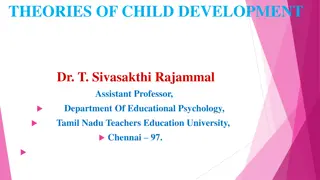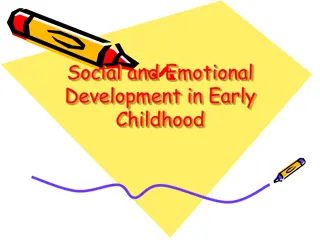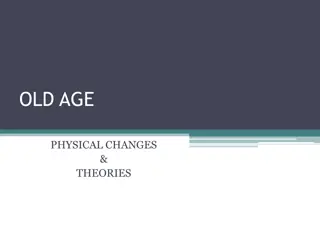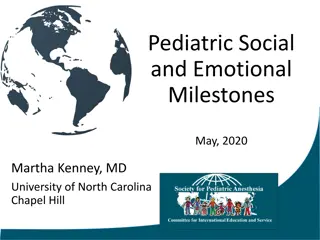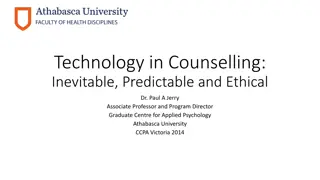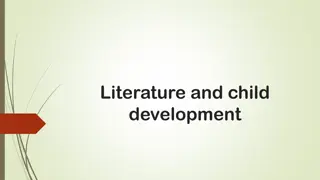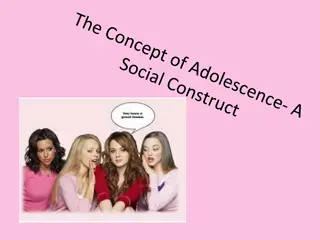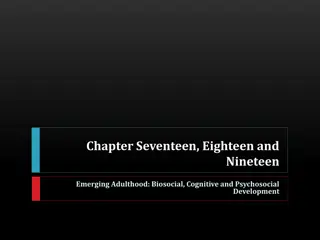Understanding Socialization: Process, Importance, and Agents
Socialization is the process through which individuals adapt to society, internalize its values, and acquire proper behavior. It involves stages like primary and secondary socialization, influenced by theorists like Erikson and Piaget. Agents like family, peers, and institutions play key roles in sh
2 views • 22 slides
Understanding Theories of Child Development by Dr. T. Sivasakthi Rajammal
Child development theories such as Erikson's psycho-social theory, Piaget's cognitive development theory, and Kohlberg's moral development theory explain how children grow and change across different stages of childhood. These theories focus on various aspects of development including social, emotio
0 views • 27 slides
Early Childhood Social and Emotional Development Insights
Social and emotional development in early childhood is influenced by various factors such as family dynamics, parenting styles, peer interactions, and cultural backgrounds. Erikson's stages highlight the importance of initiatives and self-understanding in shaping emotional growth. Parents play a cru
2 views • 35 slides
Understanding Physical Changes in Old Age and Relevant Theories
Late adulthood, typically starting around age 65, is a period where individuals confront the psychosocial task of integrity versus despair. Geropsychology plays a vital role in studying aging and providing clinical support. Erikson's ninth stage of psychosocial development suggests that older adults
1 views • 14 slides
Understanding Late Adulthood Psychosocial Development - Erik Erikson's Perspective
Late adulthood brings the stage of Integrity vs. Despair according to Erik Erikson, where reflection on life's achievements leads to either satisfaction or despair. Revisiting earlier life stages in the ninth phase can evoke new conflicts. Successful adjustment may lead to gerotrancendence, a deeper
0 views • 46 slides
Understanding Pediatric Social and Emotional Milestones in Anesthesia
Tailoring preoperative assessment and anesthetic management to a child's developmental level is crucial. Children's responses to stress vary based on their cognitive potential and developmental stage. Incorporating behavioral techniques informed by developmental theories like Piaget's and Erickson's
0 views • 24 slides
Navigating Technology in Counselling: A Professional Perspective
Embracing technology in counseling is not just inevitable but essential for growth. This article by Dr. Paul A. Jerry explores the integration of technology in professional practices, mapping reactions through established theories, and addressing ethical considerations. It emphasizes the need for co
0 views • 12 slides
Understanding Child Development Through Key Researchers
Researchers like Jean Piaget, Erik Erikson, and Lawrence Kohlberg have studied various aspects of child development, focusing on cognitive, social, and moral aspects. Piaget's stages of cognitive development, Erikson's psychosocial stages, and Kohlberg's levels of moral reasoning provide insights in
0 views • 8 slides
Understanding Adolescence: A Transition Phase Explained
Adolescence, a critical transition phase between childhood and adulthood, involves acquiring skills for the adult world. While theories by Piaget, Maslow, Kohlberg, and Erikson provide insights, criticisms exist due to Western-centric views. Some propose three distinct stages - early teens, late tee
0 views • 15 slides
Insights on Emerging Adulthood and Psychosocial Development
Delve into the unique stage of emerging adulthood, spanning ages 18-25, characterized by factors like delayed marriage, higher education pursuits, and vocational instability. Explore themes of homeostasis, risk-taking behavior, psychopathology risks, and Erik Erikson's stage of Intimacy vs. Isolatio
0 views • 43 slides

